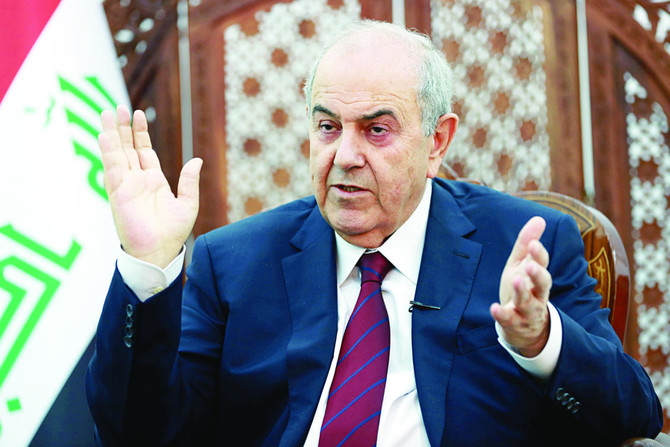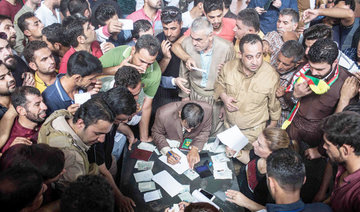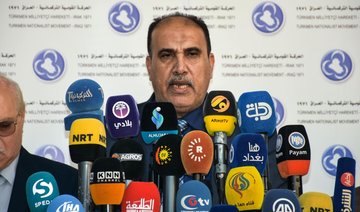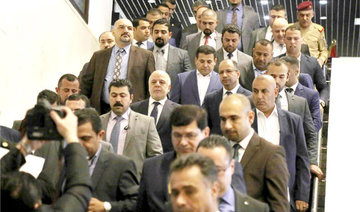BAGHDAD: Iraqi Vice President Ayad Allawi on Monday warned there could be a “civil war” over the Kurdish-administered city of Kirkuk if talks over Kurdish independence are left unresolved.
Allawi, in an interview with The Associated Press, urged Kurdish leader Masoud Barzani, as well as Iraq’s central government and its Iranian-backed militias, to show restraint and resolve their disputes over the oil-rich city.
Ruling out a military solution to the crisis, Ihssan Al-Shimari, an adviser to Iraqi Prime Minister Haidar Al-Abadi, told Arab News: “Talking about a civil war between Kurds and Arabs is an attempt to pressure both sides — Baghdad and Kurdistan — but the reality on the ground doesn’t indicate any of these expectations.”
Al-Shimari said: “The prime minister has flatly refused to fight Kurdish citizens and still relies on constitutional measures, which offer a wide range of options to the federal government to deal with the crisis.”
He added: “Kirkuk is a disputed area, and according to the constitution its administration has to go back to the Iraqi federal government.”
Kirkuk was included in Iraqi Kurdistan’s independence referendum last month, even though it falls outside the autonomous Kurdish region in the country’s northeast.
The ethnically mixed city has been administered by Kurdish forces since 2014, when the Iraqi military fled a Daesh advance.
The referendum was held despite strong objections from Baghdad, Ankara and Tehran. Barzani has not yet declared independence.
“Iraqis should be left alone to discuss their own problems without interference,” said Allawi. “Kirkuk has become a flashpoint.”
The head of the Asaib Al-Haq militia, Qais Khazali, on Sunday warned that the Kurds were planning to claim much of northern Iraq, including Kirkuk, for an independent state, after they voted for independence in a controversial but non-binding referendum two weeks ago.
He said it would be tantamount to a “foreign occupation,” reported the Afaq TV channel, which is close to the state-sanctioned militia.
Allawi, a former prime minister, said any move by the country’s Popular Mobilization Units (PMUs), which include Asaib Al-Haq, to enter Kirkuk would “damage all possibilities for unifying Iraq” and open the door to “violent conflict.”
He said if the government controls the PMUs, as it claims, it “should restrain them, rather than go into a kind of civil war.” Allawi also urged the Kurdish side “not to take aggressive measures to control these lands.”
Mohammed Naji, a lawmaker and a senior leader of Badr — one of the most prominent Iraqi Shiite militias — told Arab News: “It’s early to pick up the last option (confrontation). The federal government will use all available measures to contain the crisis, and using (military) power to impose federal authority (in Kirkuk) and preserve the unity of Iraqi lands and people will be the last option.”
Naji said: “From the beginning, we’ve said the referendum is unconstitutional. It violates the first item of the Iraqi constitution, and any action that aims to divide Iraq is unacceptable to all Iraqis.”
He added: “Resolving the problem of Kirkuk and the other disputed areas would be according to the constitution, and we can go back to talks (with the Kurds) under the umbrella of the constitution.”
He continued: “We’ve asked both parties (Baghdad and Irbil) to abide by the constitution, but if the Kurdish brothers insist on their stubbornness, this means they want to go with the hardest option, which is confrontation.”
Al-Abadi demanded that the Kurdistan Regional Government annul the referendum result, and called for joint administration of Kirkuk. Baghdad has closed Iraqi Kurdistan’s airspace to international flights.
Turkey and Iran have threatened punitive measures against the Kurdish region, fearing the encouragement of separatist sentiment among their own Kurdish populations.
Iraqi VP warns of ‘civil war’ over Kurdish-held Kirkuk
Iraqi VP warns of ‘civil war’ over Kurdish-held Kirkuk

Saudi Arabia, Algeria deepen economic ties with new business pacts

JEDDAH: Saudi Arabia and Algeria signed a series of agreements to boost trade and investment as officials and executives from both countries convened in Algiers for a high-level forum.
The Saudi-Algerian Business Forum, held on April 20 in the Algerian capital, featured extensive discussions on enhancing bilateral economic cooperation across sectors including tourism, agriculture, construction, and manufacturing, the Saudi Press Agency reported.
This comes as Saudi Arabia and Algeria maintain long-standing economic and diplomatic ties, anchored by their membership in the Arab League and OPEC. Trade between the two has steadily grown, with Saudi Arabia becoming a key supplier of industrial goods, petrochemicals, and plastics to Algeria.
In a speech at the opening of the forum, Saudi Ambassador to Algeria Abdullah bin Nasser Al-Busairi described the economic meeting as a key driver for strengthening bilateral relations, highlighting the commitment of both countries’ leaderships to deepening ties across all sectors.
He pointed out that “the forum is an opportunity to discuss joint cooperation in light of the positive indicators witnessed by trade exchange between the Kingdom and Algeria, which amounts to nearly $1 billion,” SPA reported.
Al-Busairi highlighted the notable growth of Saudi investments in Algeria, particularly in the pharmaceutical and food industries, “calling on Saudi investors to explore the opportunities available in the Algerian market, in light of the guarantees and benefits provided by the new investment law.”
Al-Busairi expressed his confidence that “the bilateral meetings between Saudi and Algerian businessmen will result in practical initiatives that serve the interests of both countries and enhance the level of cooperation and partnership between them,” the SPA added.
The chairman of the Saudi-Algerian Business Council, Raed bin Ahmed Al-Mazrou, emphasized that the time has come to elevate bilateral relations, particularly in the economic sector.
He highlighted the strong support from the leaderships of both countries for this initiative and their commitment to strengthening and advancing it.
He noted the investment opportunities offered by the Algerian market, the long-standing Saudi experience spanning more than five decades, and the openness of the Saudi market to initiatives by Algerian investors, in order to advance and enhance cooperation between the two countries.
Kamel Moula, president of the Algerian Council for Economic Renewal, said the forum offers a valuable platform to establish successful ventures and exchange expertise, contributing to sustainable growth in both countries.
He pointed to promising opportunities in sectors such as food manufacturing, iron and steel, tourism and entertainment, and information and communication technology.
Pakistan says Saudi Arabia has granted additional 10,000 slots for private Hajj scheme

- Nearly 90,000 Pakistanis are expected to perform Hajj pilgrimage under government scheme
- Around 23,620 Pakistani were to perform Hajj through private scheme before new slots added
ISLAMABAD: Religious Affairs Minister Sardar Muhammad Yousaf said on Monday Saudi Arabia had granted Pakistan an additional 10,000 slots for Hajj pilgrims traveling under the private scheme.
The annual Islamic pilgrimage is expected to take place this year in June. Pakistan and Saudi Arabia signed the Hajj Agreement 2025 in January, under which Pakistan was given a quota of 179,210 for the pilgrimage to be divided equally between government and private schemes.
Nearly 90,000 Pakistanis are expected to travel to Saudi Arabia under the government scheme this year and 23,620 Pakistani were to perform Hajj through private tour operators, which means that over 60,000 slots from the total quota had remained unfilled.
“We have been allowed 10,000 more in the quota, this is not government but private quota,” Yousaf told reporters.
The development has not yet been confirmed by Saudi authorities.
Prime Minister Shehbaz Sharif has constituted a three-member inquiry committee to probe why Pakistan had failed to use the full 179,210 quota for Hajj 2025.
Hajj flight operations will begin from Apr. 29 with the first flight departing from Pakistan’s eastern city of Lahore.
While a precise number for Hajj 2025 is difficult to determine in advance, projections suggest it will be a record-breaking year, with over 2.5 million pilgrims expected.
Philippines, US to conduct first ‘full battle test’ during joint military drills

- About 14,000 Filipino, American soldiers involved in the annual exercises
- Drills take place as tensions simmer between Manila and Beijing over disputed South China Sea
MANILA: The Philippines and the US began their annual joint military drills on Monday, which will, for the first time, include “full battle tests” to simulate real-world combat in the face of regional security concerns, including tensions in the South China Sea.
The exercises, known as Balikatan — Tagalog for shoulder-to-shoulder — will run until May 9 and involve about 14,000 troops, including 9,000 from the US and about 150 Australian forces.
“This is a signature exercise dedicated to maintaining a free and open Indo-Pacific and ensuring the defense of the Philippines,” Lt. Gen. James Glynn, commander of US Marine Corps Forces Pacific, said at an opening ceremony. We will push ourselves and our equipment to the edge of our capabilities.”
Glynn described the full battle tests — conducted for the first time since the drills began 30 years ago — as the “purposeful integration of real-world security challenges relevant to the region.”
Throughout the three-week exercise, soldiers from the two militaries will participate in live and simulated training where capabilities of both forces will be measured in numerous scenarios.
Balikatan is “about testing our ability to defend, to de-escalate and to respond together,” Glynn said.
This year, the drills will also feature an array of US weapons that include the NMESIS anti-ship missile system and HIMARS rocket launchers.
More than a dozen countries are sending observers to the drills, including first-timers such as Poland, the Czech Republic and the Netherlands.
The exercises take place at a time of continued tension in the South China Sea between China and the Philippines, which have been involved in frequent maritime confrontations in recent years.
Manila and Beijing have overlapping claims in the resource-rich waterway, a route for much of the world’s commerce and oil.
China has been increasing its military activity over the past few years, with the Chinese Coast Guard regularly encroaching on the Philippine part of the waters, the West Philippine Sea, despite a 2016 ruling by an international tribunal in The Hague dismissing Beijing’s expansive claims.
The Philippines, meanwhile, has been steadily deepening its defense cooperation with other countries, including treaty ally the US, since President Ferdinand Marcos Jr. took office in 2022.
“Balikatan is not against any nation,” said Maj. Gen. Francisco Lorenzo Jr., Balikatan exercise director from the Armed Forces of the Philippines.
“It is joint training with the US to increase our capability to secure our territory. It enhances our responsiveness and deters possible incursions or invasions.”
The drills this year will emphasise interoperability across domains, including maritime and air defense, and stretch from Palawan to the northern Luzon islands — areas facing the South China Sea and Taiwan.
“During this year’s Balikatan, we underscore our drive to modernize the armed forces of the Philippines, enhancing interoperability with our allies and reinforce the comprehensive archipelagic defense concept,” said AFP chief Gen. Romeo Brawner Jr.
“It is our way of ensuring that the AFP remains a capable, agile and forward-thinking force, prepared to defend and ready to respond and poised to lead.”
Farasan Islands celebrate annual harid fish arrival

RIYADH: The shores of the Farasan Islands are witnessing the annual arrival of large schools of harid fish, which travel for months from the Indian Ocean, through the Arabian Sea, and into the Red Sea.
The harid fish, or parrotfish, is a diverse species inhabiting coral reefs and plays a key role in the marine ecosystem.
Recognizable by its parrot-like beak and vibrant colors, the harid thrives in coral-rich habitats, with over 90 species, each having unique shapes and colors.
Farasan, a group of coral islands 40 km off Jazan’s coast, becomes the site of this natural event as vast schools of harid fish gather, according to the Saudi Press Agency.
Residents can predict the fish’s arrival by a distinct scent carried from the sea after sunset on the 15th day of the lunar month.
The annual harid catch, celebrated in late April, is a tradition reflecting the islands’ cultural heritage and has brought joy to Farasan for centuries.
Recognizing the cultural and tourism significance of harid fishing, Jazan Gov. Prince Mohammed bin Nasser inaugurated the first Farasan Islands Harid Festival in 2005.
The 21st edition of the festival launched on Monday, showcasing the islands as a promising destination for tourists and investors.
The festival highlights Farasan’s unique customs, traditions, folk games, handicrafts, and historical sites, while also showcasing local handicrafts such as fishing traps, palm weaving, bag and rug creation, and hat knitting.
Dubai inflation eases to 2.79% in March as housing, transport costs moderate

RIYADH: Dubai’s annual inflation rate eased in March, hitting its lowest level since October 2024, according to official data released by the Dubai Statistics Center.
The inflation rate in the emirate slowed to 2.79 percent in March, down from 3.15 percent in February. The decline was primarily driven by a deeper deflation in food and beverage prices, which dropped by 3.34 percent year-on-year, compared to a 0.85 percent decline in the previous month.
Dubai continues to report relatively moderate inflation compared to other major cities in the region. Analysts attribute this trend to the government’s proactive measures to maintain price stability while fostering economic growth.
Despite persistent global inflationary pressures, Dubai’s economy remains resilient, supported by a diverse mix of sectors including tourism, real estate, and trade.
Looking ahead, the UAE Central Bank has forecast nationwide inflation at 2 percent for 2025 —well below the global average. Non-tradable components of the consumer basket are expected to be the main contributors to price movements in the coming year.
The March data also pointed to continued deflation in other key categories. Food and beverage prices posted a monthly deflation rate of 0.31 percent, slightly higher than the 0.21 percent recorded in February.
Clothing and footwear prices declined 2.69 percent year on year, mirroring the previous month’s figures. Meanwhile, prices in the information and communication sector saw a 1.96 percent annual drop in March, compared to a 1.95 percent decline in February.
The data also showed a continued rise in prices within several key sectors. The housing, water, electricity, gas, and other fuels category recorded a 7.16 percent increase in March, slightly down from 7.36 percent in February.
The insurance and financial services sector experienced notable inflation as well, with prices rising 5.83 percent, up from 5.20 percent the previous month.
Price increases were also observed across health, education, and personal care, social protection, and miscellaneous goods and services. Health costs climbed 3.1 percent, education rose 2.76 percent, and personal care and related services increased 2.52 percent.
For comparison, September’s figures showed no change in health and education, while personal care had risen by 1.48 percent.
The tobacco sector registered a 2.12 percent year-on-year increase, unchanged from February. Meanwhile, prices in the recreation, sport, and culture category grew 1.66 percent, though at a slower pace compared to 3.93 percent in the previous month.
Additional monthly gains were recorded in insurance and financial services, which edged up 1.47 percent in March versus 1.41 percent in February. Prices for furnishings, household equipment, and routine maintenance rose 0.36 percent, matching the previous month’s rate. The restaurants and accommodation services category saw a 0.25 percent increase, down from 0.72 percent in February.
In a separate report published in December, FOREX.com, a subsidiary of US-based StoneX Group Inc., projected strong economic resilience for the UAE in 2025.
The outlook was supported by solid consumer spending, record-high foreign direct investment, and the nation’s ongoing economic diversification efforts, despite regional challenges.
















